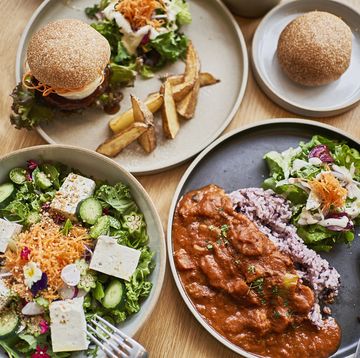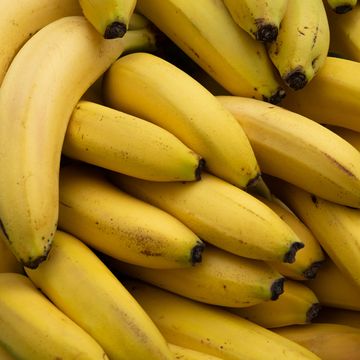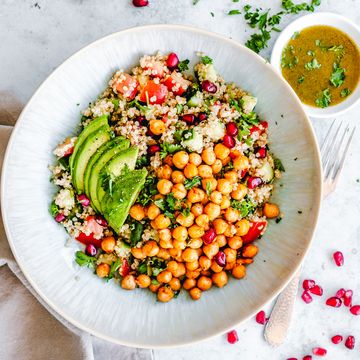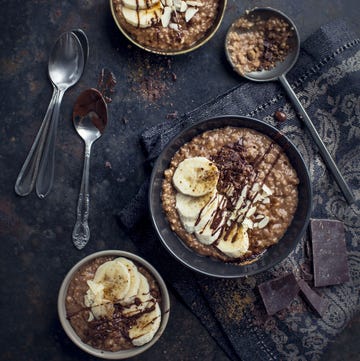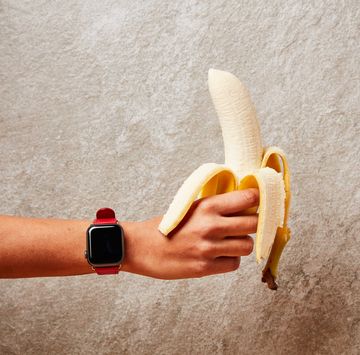- A new study comparing whey- and milk-based protein recovery drinks with a carbohydrate-only recovery drink found that neither protein beverage provided significant muscle soreness or recovery benefits over the carb-only drink.
- The study concluded that “well balanced nutritional practices” might be the best recovery strategy.
The secret to strength training gains is all in the recovery process. Weight lifting breaks down your muscle fibres, so they can recover bigger and stronger and make you more powerful. Protein helps that recovery process, which is why many gym goers faithfully chase down heavy workouts with a protein-rich drink in the hopes of speeding up repair and staving off muscle soreness.
But how necessary is that post-workout shake, really?
New research Best winter running gear Journal of Human Kinetics brings that practice into question, showing that high protein beverages are no more effective than plain carbohydrate sports drinks for promoting muscle recovery and assuaging soreness.
The study included 30 men between the ages of 20 and 30 who were experienced weight lifters. They were divided into three recovery-drink groups: One group of 10 lifters received a whey hydrolysate-based drink; another 10 got a milk-based drink, and the final group was given a flavoured dextrose (carbohydrate) drink.
All the drinks contained about 530 calories; the protein drinks both contained about 33 grams of protein, 98 grams of carbs, and 1 gram of fat. Neither the researchers nor the lifters knew who was going to be receiving which drink.
The men then performed strength and power assessments, including seated medicine ball throws and squat jumps, and an intensive resistance training session, including squat, bench press, deadlift, military press, and bench pull exercises.
When they were done, the lifters chugged their beverages and then came back for re-testing after 24 and again 48 hours later—when you’d expect delayed onset muscle soreness to have fully set in. And it had.
The researchers had the volunteers rate their levels of muscle soreness on a 0 to 200 scale, with 0 being not one bit sore and 200 being as bad as it gets. They also repeated the strength and power assessments to test their muscle function.
All the men showed significant increases in their levels of muscle soreness 24 and 48 hours after their training session, with ratings for all three groups rising to over 90. This was about four times higher than their baseline ratings, which ranged from 19 to 26. All the men also had reductions in muscle power and function.
The kicker, though, was there was no difference in soreness, performance, or recovery between the different groups. Regardless of whether they got protein—or what type of protein they got—they were still just as sore and compromised 24 and 48 hours following the intense gym session.
“While proteins and carbohydrates are essential for the effective repair of muscle fibres following intensive strength training, our research suggests that varying the form of protein immediately following training does not strongly influence the recovery response or reduce muscle pain,” lead author Thomas Gee, Ph.D., said in a press release.
That’s not to say taking in balanced nutrition after a hard workout isn’t important, Gee, who is also senior lecturer in strength and conditioning the University of Lincoln in the U.K., told Bicycling.
“I would expect and hypothesise, based on previous literature and theory, that recovery would be enhanced with the three drink conditions vs. water only,” he said.
But you don’t necessarily need to pour money into pricey recovery drinks to get the same effect.
“We would hypothesise that well-balanced daily nutrition practices would influence recovery from delayed onset muscle soreness to a greater extent,” Gee said in the release. That means getting enough protein throughout the rest of the day is still important.
Though the study didn’t include women, women’s sports physiology and nutrition researcher Stacy Sims, Ph.D., believed the results would likely be similar in this specific circumstance.
“When considering recovery drinks postresistance training, if you are not doing the workout fasted, the recovery drink is a bit of a moot point, as there is no full depletion of fuel, but there is a release of amino acids from muscle breakdown,” Sims said. “But if you’re doing HIIT-type resistance training fasted or long, steady-state endurance training, that’s a different kettle of fish, because you become so fully depleted that you do need that timed recovery drink.”
The take home message here: Fuel your general training with a healthy, balanced diet throughout your entire day, and save the commercial recovery drinks for when you really need them: following an exhausting race or training session when you need to restock your glycogen stores as quickly and efficiently as possible, along with some rehydration.
The best high-carb foods for runners? Sign up to our newsletter Heres how much protein you should be eating.





